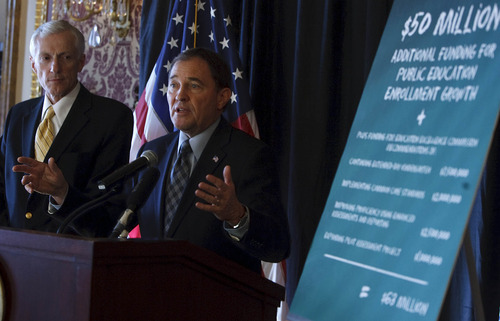This is an archived article that was published on sltrib.com in 2010, and information in the article may be outdated. It is provided only for personal research purposes and may not be reprinted.
After years of austere budgets that saw more than $1 billion carved from state government, Gov. Gary Herbert is proposing a blueprint for a state he said is beginning to take steps toward recovery.
Herbert's $11.9 billion budget proposal includes more than $216 million expected from economic growth, the first time since 2007 that Utah's governor has had the luxury of not having to propose cuts to the state budget.
"It's hard to wipe the smile off my face because it means what we've done in the past is working today," Herbert said. "We kept government off your backs and out of your wallets and the result is clear."
With that new money, Herbert proposes providing funds for most of the new students entering public schools, alleviating crowding in the state prisons, and keeping most other state departments relatively unchanged.
Herbert said it is the first step toward restoring some of the deep cuts made to state government in recent years.
"We're not to the destination we need to be, but we're going to get there," he said.Ultimately, the governor's budget is just a proposal. Next month, the Legislature will begin the task of setting the final numbers for the 2012 fiscal year, which runs from July 1, 2011, to June 30, 2012.
By the end of that fiscal year, the state is projected to be a whisker away from 3 million people but will still have 6.1 percent unemployment, forecasters predict.
Herbert did not propose any increases in taxes or fees, although he is recommending a change to the way self-employed workers file their taxes. Instead of filing annually, they would be required to file quarterly, which provides a $130 million infusion by accelerating those collections.
The governor is proposing $50 million in increased spending to pay for the anticipated student growth in Utah's public schools next year.
He is recommending $40 million in additional funding to provide health insurance to low-income people and children and to provide residential treatment for children in state custody. Indeed, the Health Department saw the single largest increase in the state budget, as health costs continue to be a major driver in the budget, Medicaid in particular.
Herbert said that in meetings with governors across the country, there is a growing frustration with health entitlements taking more and more of the state budgets, and Washington has to do something.
"[Medicaid growth] is the bankrupter of the state if we can't get it under control," said Senate President Michael Waddoups, R-Taylorsville, who said he anticipates the Legislature will be asked to try to control costs.
Funding for higher education will remain flat, even as enrollment is expected to grow by several thousand students.
Bill Sederburg, the commissioner of higher education, said 6,000 new students enrolled in Utah's public colleges and universities this year without any new funding. Nearly that many more are expected next year.
All told, enrollment has spiked by 20,000 students during the past several years and budgets have been cut by 12 percent. That has meant larger classes, faculty teaching more courses and higher tuition for the students. College presidents, he said, are worried they will lose faculty to private universities, and the system is stretched thin.
"We're reaching that [breaking] point," Sederburg said. But he said that given the constraints Herbert was working with, the budget is a good one, and higher education officials will try to do better with the Legislature.
Herbert is seeking to address a prison system that is at capacity by requesting $10 million to house prison inmates in county jails and open a parole violator center that had been postponed to control costs.
Tom Patterson, director of the Department of Corrections, said he hopes that gets the system down to a manageable level that is safer for guards.
There is bad news for state employees, however. Herbert is not proposing giving workers a pay raise — the third year without a pay raise — and expects them to pay more of their health insurance costs.
"That's the hard part. Once again we are status quo and their payments will go up," said Patterson. "That's an area where we wish we had better news, but … we're glad we don't have to take cuts."
State workers paid just 2.5 percent of their health insurance costs last year. The Legislature doubled that to 5 percent and Herbert's budget would increase it to 10 percent.
"There's a lot of people out there who still don't have jobs," said Lance Davenport, commissioner of public safety. "We're doing our part. We're tightening our belt. We're sacrificing just like everybody else."
Herbert said state government has shed more than 1,000 workers this year as it has taken its share of the pain of the recession.
"It is a concern as we have this fast-growing state," he said. "But government can't be 100 percent when the private sector is 90 percent."
All of the other departments would essentially receive the same amount of money they got last year, under Herbert's proposal, even though some of them are seeing greater demands for services.
"Our watch phrase last year was to do more with less. Our watch phrase this year is to do more with the same," Herbert said. —
Utah's financial picture
Here's how changes in the major revenue sources look:
Sales tax - $58M - 3.7%
Individual income tax + $78M + 3.5%
Corporate income tax + 62M + 24%
Gas tax + $3.8M + 0.9%



